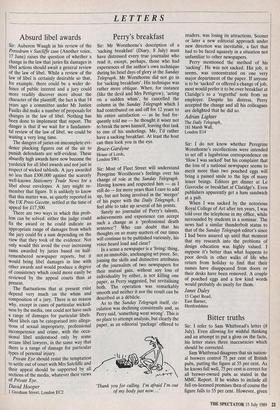Sir: Most of Fleet Street will understand Peregrine Worsthorne's feelings
over his change of role at the Sunday Telegraph. Having known and respected him — as I still do for more years than I care to add up, but not being involved in the 'merger' of his paper with the Daily Telegraph, I feel able to take up several of his points.
Surely no journalist of Perry's talents, achievements and experience can accept such a change as a 'professional death sentence'? Who can doubt that his thoughts on so many matters of our times will continue to be published variously, his voice heard loud and clear?
In a sense a newspaper is a 'living: thing, not an immobile, unchanging set piece. So, joining the skills and distinctive attributes of the journalists of two newspapers for their mutual gain, without any loss of individuality by either, is not killing one paper, as Perry suggested, but revitalising both. The operation was remarkably smooth and neither it nor the result can be described as a debacle.
As to the Sunday Telegraph itself, cir- culation was declining consistently and, as Perry said, 'something went wrong'. This is no place to attempt analysis, but clearly the paper, as an editorial 'package' offered to `Thank you for calling. I'm afraid I'm out of my body just now.. .' readers, was losing its attractions. Sooner or later a new editorial approach under new direction was inevitable, a fact that had to be faced squarely in a situation not unfamiliar to other newspapers.
Perry mentioned the method of his `sacking'. He was not sacked. His job, it seems, was concentrated on one very major department of the paper. If anyone is to be 'sacked' or offered a change of job, most would prefer it to be over breakfast at Claridge's to a 'regretful' note from an employer. Despite his distress, Perry accepted the change and all his colleagues are delighted that he did so.
Adrian Lighter
The Daily Telegraph, 181 Marsh Wall, London E14


















































 Previous page
Previous page